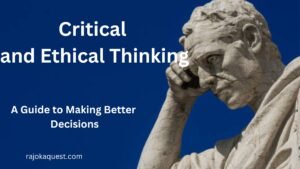Critical Thinking Activity: Enhancing Skills for Better Decision-Making

Critical Thinking Activity
Critical Thinking Activity: Enhancing Skills for Better Decision-Making
The ability to think critically has become an essential talent in an increasingly complex world where information flows at an unprecedented pace. Developing critical thinking can considerably improve problem-solving skills, decision-making, and creativity, regardless of whether in the workplace, personal life, or academic spaces. One of the most effective methods for cultivating these abilities is through a well-organized critical thinking exercise, which allows individuals to logically analyze situations, query assumptions, and reach well-reasoned conclusions.
In this article, we will delve deeply into the definition of critical thinking, examine the reasons why it is so vital today, and discuss a variety of essential activities of thinking that can assist individuals in enhancing their analytical abilities.
What is critical thinking?
It is imperative to comprehend the true definition of critical thinking before engaging in critical thinking activities. Critical thinking is making informed decisions by actively and objectively evaluating information from various sources, identifying biases, analyzing assumptions, and utilizing logic and reason. It entails examining and challenging concepts rather than unquestioningly accepting them.
Critical thinking is not solely concerned with skepticism. It involves the capacity to evaluate evidence, evaluate alternative perspectives, and arrive at well-reasoned, logical conclusions. Individuals who participate in critical thinking activities are more adept at navigating the present day’s intricate and occasionally perplexing information landscape.
What is the significance of critical thinking?
Due to the proliferation of social media and the internet, we are inundated with overwhelming information. Strong critical thinking skills are necessary to differentiate between what is accurate, relevant, and meaningful. These abilities are indispensable not only in professional environments but also in ordinary life.
“The essence of the independent mind lies not in what it thinks, but in how it thinks.” — Christopher Hitchens.
Here is why critical thinking activities are more crucial than ever:
- Improved Decision-Making: Critical thinkers are more adept at assessing various options and outcomes, resulting in more well-informed decisions. Critical thinking is essential for a well-informed and balanced approach, whether to select a career path, make a business decision, or resolve a personal dilemma.
- Problem-Solving Skills: The capacity to think critically is a highly developed skill that allows individuals to reduce complex issues to manageable components and systematically resolve them. Problem-solving is a valuable skill in professional and academic environments, and critical thinking activities are instrumental in developing this ability.
- Enhanced Creativity: Critical thinking is frequently linked to logical and analytical thinking and contributes to creativity. Critical thinkers can generate innovative ideas or solutions by challenging assumptions and exploring new possibilities.
- Improved Communication: Through critical thinking activities, individuals acquire the ability to articulate their ideas in manneran informative and persuasive manner. This enhanced clarity results in more effective communication in both written and spoken forms. It enables individuals to communicate their arguments effectively, resulting in more productive discussions.
- Avoiding Cognitive Biases: Every individual possesses prejudices that affect their thought processes. A critical thinker can identify these biases, which are present in both themselves and others and can take steps to mitigate them. Through critical thinking exercises, individuals are instructed to query their assumptions and evaluate alternative viewpoints.
Engaging in a Critical Thinking Activity
Participating in consistent critical thinking exercises fosters the development of this indispensable ability. Numerous methods exist for cultivating critical thinking, including group discussions and debates, puzzles, and logic games. The following section lists several essential thinking activities that enhance participants’ cognitive abilities. These activities can be implemented in educational environments, workplaces, or informal group settings.
1. The Socratic Method
The Socratic Method is one of the most influential and ancient critical thinking activities. It entails posing inquiries to elicit more profound thought and challenge preconceived notions. The objective is not to offer solutions but to motivate individuals to reflect on the evidence that critically substantiates them.
For instance, during a group discussion, the facilitator may request that participants provide a rationale for a widely held conviction, such as “Success is contingent upon diligence.” The facilitator then asks follow-up questions, such as, “Are there any other factors that contribute to success?” or “Can you think of examples where hard work did not lead to success?” This line of inquiry encourages participants to reevaluate their assumptions and investigate alternative perspectives.
2. Obstacles to Problem Solving
Problem-solving challenges are a prevalent form of critical thinking activity that aids in developing participants’ analytical and reasoning abilities. These activities can be customized to accommodate various environments, including classrooms, workplaces, and group settings.
For instance, participants may be presented with a complex scenario or puzzle, such as a business problem that requires resolution, a case study, or a hypothetical calamity scenario. Afterward, they must evaluate the circumstances, identify potential solutions, and assess the advantages and disadvantages of each alternative. Problem-solving challenges foster the development of creative thinking, data analysis, and collaboration among individuals.
3. Discussion and Debate
Debates are exceptional critical thinking exercises that enable individuals to investigate various perspectives on an argument. In a debate, participants must research a subject, present a well-supported argument, and respond to counterarguments. This process assists in cultivating the capacity to employ logical reasoning and evidence to support one’s stance and analyze various viewpoints.
For example, a classroom debate on a contentious issue such as artificial intelligence or climate change can require participants to evaluate the information they present critically, consider opposing perspectives, and present their case persuasively.
4. Mind Mapping
Mind mapping is a visual critical thinking exercise that assists individuals in organizing their thoughts and ideas. It is especially beneficial for investigating intricate subjects or issues with numerous aspects. Organizing ideas, connections, and relationships, participants can develop a more comprehensive comprehension of a subject and engage in more critical thinking.
For instance, a mind map can be employed to investigate the numerous variables influencing a business decision. Participants can begin by identifying the central concept and then expand to include pertinent factors, including market conditions, financial considerations, and competitor actions. This structured approach promotes a comprehensive analysis and assists participants in gaining a global perspective.
5. Scenarios of Role-Playing
Role-playing is an engaging and dynamic critical thinking activity that lets participants consider a situation from various angles. Participants are required to think critically about the motivations, challenges, and consequences that influence the decisions of the character they are portraying by assuming somebody else’s perspective.
For example, in a business or leadership training session, participants may be assigned responsibilities in a hypothetical corporate scenario. One participant may represent the CEO, while another may represent a department chief. In the event of a crisis or merger, the participants must make decisions per their designated duties and navigate a complex situation. They were role-playing fosters empathy, creativity, and the capacity to evaluate situations from multiple perspectives.
6. Lateral Thinking Puzzles
Lateral thinking puzzles, or “thinking outside the box” puzzles, are exceptional critical thinking exercises that require participants to approach problems from unconventional perspectives. The solutions to these puzzles typically necessitate inventive thinking rather than conventional logical reasoning.
For instance, consider the following classic lateral thinking puzzle: “A man departs his residence, executes three left turns, and returns to discover two masked individuals waiting for him.” “Who are the individuals who are wearing masks?” The solution necessitates that participants abandon literal interpretations and adopt a more abstract perspective (they are the umpire and catcher in a baseball game).
These puzzles are a delightful method of engaging the brain and honing critical thinking skills in a casual and pleasurable environment.
Engaging in Critical Thinking Activities in Daily Life
Although critical thinking activities are frequently associated with formal contexts such as classrooms or training workshops, it is feasible to incorporate these exercises into daily life. There are several methods to accomplish this:
Enquiring about Assumptions: Whenever you come across new information, whether a news story, a social media post, or a conversation with a friend, take a moment to ask yourself questions. What is the underlying premise of this information? Is there any empirical evidence to substantiate it? Is there a potential alternative explanation?
Engage in Discussion: Meaningful discussions with others can assist in the development of critical thinking skills. Do not hesitate to address complex subjects. Instead, engage with them with an open mind, attend to the perspectives of others, and critically evaluate the information presented.
Read and Reflect: One of the most effective methods for cultivating critical thinking is engaging in regular reading, particularly on diverse subjects. After perusing an article, book, or research paper, dedicate some time to contemplating the concepts introduced. What did you concur with? What did you object to, and why?
Solve Puzzles and Games: Participating in strategy games, puzzles, and logic problems can help maintain one’s critical thinking abilities. These activities are enjoyable and effective methods of practicing critical thinking, as they require the brain to think in new ways.
Conclusion
Cultivating critical thinking skills is more vital than ever in a world perpetually inundated with information. Participating in essential thinking activities can enhance individuals’ capacity to analyze data, solve problems, and make more informed decisions.
Critical thinking can be fostered and refined through various methods, including formal activities such as debates and problem-solving challenges and informal methods like interrogating assumptions and reflecting on reading. It is not merely a skill for academics or professionals; it is a critical instrument for overcoming the complexities and obstacles of life. By consistently participating in essential thinking activities, we can become more informed, effective, and considerate thinkers.
Read more, Click Here.



